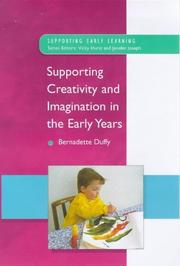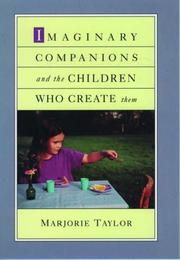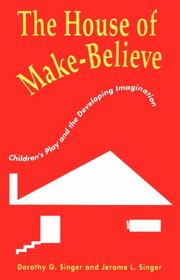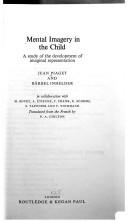| Listing 1 - 10 of 32 | << page >> |
Sort by
|
Book
Year: 1903 Publisher: Paris : F. Alcan,
Abstract | Keywords | Export | Availability | Bookmark
 Loading...
Loading...Choose an application
- Reference Manager
- EndNote
- RefWorks (Direct export to RefWorks)
Book
ISBN: 2100756486 Year: 2016 Publisher: Paris (5 Rue Laromiguière 75005) : Dunod,
Abstract | Keywords | Export | Availability | Bookmark
 Loading...
Loading...Choose an application
- Reference Manager
- EndNote
- RefWorks (Direct export to RefWorks)
Anne Gatecel en appelle ici aux professionnels de la petite enfance. De plus en plus d'enfants viennent en consultation pour des troubles de l'apprentissage ou du sommeil. Derrière ces symptômes, se cache souvent une difficulté d'accès à l'imaginaire. L'imaginaire regroupe des activités diverses et essentielles comme le jeu, la création, le rêve... II n'y a rien de plus sérieux pour un enfant que de jouer, et de plus difficile pour ses parents que de se prêter à ses jeux. Ce livre ouvre le débat sur le prix à payer pour l'enfant de la course incessante à la performance et de la recherche de la conformité dès le plus jeune âge.
Book
ISBN: 2708218557 9782708218550 Year: 1979 Publisher: Paris : Les Éditions ouvrières,
Abstract | Keywords | Export | Availability | Bookmark
 Loading...
Loading...Choose an application
- Reference Manager
- EndNote
- RefWorks (Direct export to RefWorks)
Children's literature. --- Fantasy. --- Imagination in children.
Book
ISBN: 2130679358 Year: 1990 Publisher: Paris cedex 14 (Humensis 170 bis, boulevard du Montparnasse 75680) : Presses Universitaires de France,
Abstract | Keywords | Export | Availability | Bookmark
 Loading...
Loading...Choose an application
- Reference Manager
- EndNote
- RefWorks (Direct export to RefWorks)
Cette édition numérique a été réalisée à partir d'un support physique, parfois ancien, conservé au sein du dépôt légal de la Bibliothèque nationale de France, conformément à la loi n° 2012-287 du 1er mars 2012 relative à l'exploitation des Livres indisponibles du XXe siècle. Les auteurs ont analysé des jeux de fiction à plusieurs, produits spontanément par des enfants de trois ans, dans des milieux familiers : crèches, jardins d'enfants. « Copyright Electre »
Child psychology. --- Role playing. --- Imagination in children.
Book
ISBN: 019539576X 0199909199 0199983038 9780195395761 9780199983032 Year: 2013 Publisher: Oxford Oxford University Press
Abstract | Keywords | Export | Availability | Bookmark
 Loading...
Loading...Choose an application
- Reference Manager
- EndNote
- RefWorks (Direct export to RefWorks)
"Children are widely celebrated for their imaginations, but developmental research on this topic has often been fragmented or narrowly focused on fantasy. However, there is growing appreciation for the role that imagination plays in cognitive and emotional development, as well as its link with children's understanding of the real world. With their imaginations, children mentally transcend time, place, and/or circumstance to think about what might have been, plan and anticipate the future, create fictional relationships and worlds, and consider alternatives to the actual experiences of their lives. The Oxford Handbook of the Development of Imagination provides a comprehensive overview of this broad new perspective by bringing together leading researchers whose findings are moving the study of imagination from the margins of mainstream psychology to a central role in current efforts to understand human thought. The topics covered include fantasy-reality distinctions, pretend play, magical thinking, narrative, anthropomorphism, counterfactual reasoning, mental time travel, creativity, paracosms, imaginary companions, imagination in non-human animals, the evolution of imagination, autism, dissociation, and the capacity to derive real life resilience from imaginative experiences. Many of the chapters include discussions of the educational, clinical, and legal implications of the research findings and special attention is given to suggestions for future research."--Publisher's website.
Child development --- Child psychology --- Imagination in children
Book
ISBN: 1283907011 0857002430 9780857002433 9781849050517 1849050511 9781283907019 Year: 2010 Publisher: London Philadelphia Jessica Kingsley Publishers
Abstract | Keywords | Export | Availability | Bookmark
 Loading...
Loading...Choose an application
- Reference Manager
- EndNote
- RefWorks (Direct export to RefWorks)
The child's world often revolves around dreams and fantasy. Imaginary friends, places and play can seem entirely real, and yet in dismissing these as 'just your imagination', many adults cut a tie that can be the key to understanding a child.Unseen Worlds explores the fantastical nature of children's imaginings, and demonstrates the negative adult tendency to trivialize them. The book breaks new ground by giving voice to children of various ages to express how they encounter these different worlds, examining the dark and frightening concept of nightmares in addition to happy and playful daydre

ISBN: 0335198716 Year: 2000 Publisher: Buckingham Open university press
Abstract | Keywords | Export | Availability | Bookmark
 Loading...
Loading...Choose an application
- Reference Manager
- EndNote
- RefWorks (Direct export to RefWorks)
Creative ability in children --- Early childhood education --- Imagination in children

ISBN: 0195349156 1429403373 9780195146295 0195146298 9781429403375 1280531983 9781280531989 9786610531981 6610531986 9780195349153 0195146298 0195077040 9780195077049 0190287136 Year: 1999 Publisher: New York Oxford University Press
Abstract | Keywords | Export | Availability | Bookmark
 Loading...
Loading...Choose an application
- Reference Manager
- EndNote
- RefWorks (Direct export to RefWorks)
Imaginary companions are a common form of childhood fantasy of interest to parents, educators, and psychologists because they provide insights about children's creativity, thoughts and feelings.
Imaginary companions. --- Companions, Imaginary --- Friends, Imaginary --- Imaginary friends --- Imaginary playmates --- Playmates, Imaginary --- Child psychology --- Imagination in children --- Play --- Imagination in children. --- Play.

ISBN: 0674043685 9780674043688 0674408756 9780674408753 0674408748 9780674408746 Year: 2009 Publisher: Cambridge, MA
Abstract | Keywords | Export | Availability | Bookmark
 Loading...
Loading...Choose an application
- Reference Manager
- EndNote
- RefWorks (Direct export to RefWorks)
An attempt to cover all aspects of children's make-believe. The authors examine how imaginative play begins and develops and provide examples and evidence on the young child's invocation of imaginary friends, the adolescent's daring games and the adult's private imagery and inner thought.
Play --- Imagination in children. --- Developmental psychology. --- Development (Psychology) --- Developmental psychobiology --- Psychology --- Life cycle, Human --- Child psychology --- Psychological aspects. --- Psychological aspects --- Imagination in children --- Developmental psychology --- Play - Psychological aspects.

ISBN: 0710069219 Year: 1971 Publisher: London Routledge and Kegan Paul
Abstract | Keywords | Export | Availability | Bookmark
 Loading...
Loading...Choose an application
- Reference Manager
- EndNote
- RefWorks (Direct export to RefWorks)
| Listing 1 - 10 of 32 | << page >> |
Sort by
|

 Search
Search Feedback
Feedback About UniCat
About UniCat  Help
Help News
News